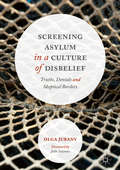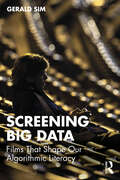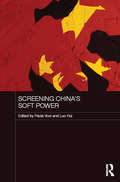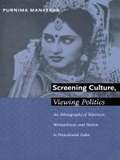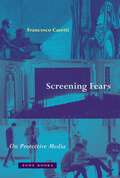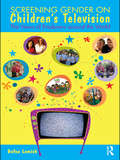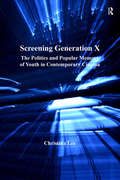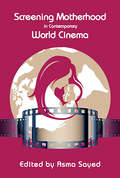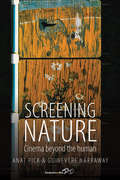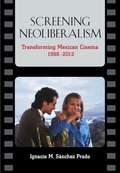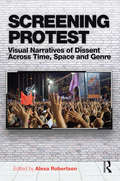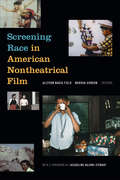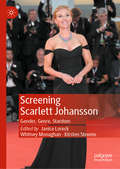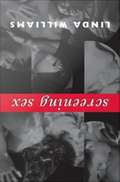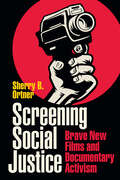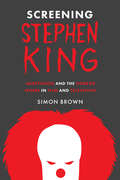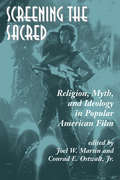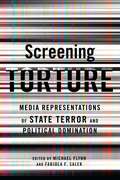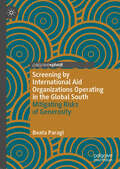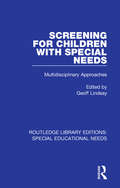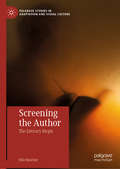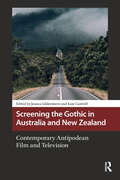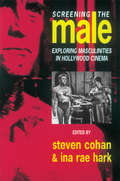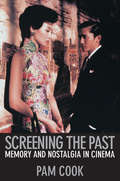- Table View
- List View
Screening Adult Cinema (Screening Cinema)
by Peter Alilunas Farrah Freibert Desirae EmbreeThis collection of 39 original essays is designed to support film screenings. Each chapter focuses on a single adult film—a category broadly construed as films that foreground sex as a primary narrative, aesthetic, or marketing element. The chapters draw on a variety of perspectives, contexts, histories, themes, and politics in examinations of style, genre, authorship, performance, and stardom.The first of its kind, Screening Adult Cinema brings together a broad range of established scholars alongside new voices to demonstrate the global breadth and diversity of adult cinema, from a variety of time periods and transnational contexts, paying particular attention to regions and films that have been underrepresented within existing adult film scholarship. Following the Screening Cinema series, Screening Adult Cinema is intended as a teaching text and reference for courses in which film screenings are a core activity, while also appealing to adult film scholars.This unique collection will be invaluable for courses on adult or exploitation film history, feminist film studies, global queer cinema, and porn studies. It will also be useful for general courses in media studies with a focus on gender, sex, and sexuality.
Screening Asylum in a Culture of Disbelief: Truths, Denials and Skeptical Borders
by Olga JubanyThis ethnographic book enhances our understanding of asylum screening, an area of immigration that is often overlooked and remains under-researched. Falsely perceived as a one-dimensional function of static state power, it is here revealed that asylum decisions at borders respond to a complex cultural construction, saturated by a meta-message of disbelief, denial and moral panics. The author demonstrates that immigration officers’ work patterns, behavior and decisions are informed by such stereotyping, which has led to asylum narratives being interpreted in the light of concepts of social acceptability and rejection. Establishing a parallel with law enforcement, the author argues that this process replicates a professional world of categorization and control, forged within an autonomous immigration service subculture. This timely work will appeal to students and scholars of migration studies, identity and ethnic studies, social anthropology, sociology, law and policy studies.>
Screening Big Data: Films That Shape Our Algorithmic Literacy
by Gerald SimThis book examines the influence of key films on public understanding of big data and the algorithmic systems that structure our digitally mediated lives.From star-powered blockbusters to civic-minded documentaries positioned to facilitate weighty debates about artificial intelligence, these texts frame our discourse and mediate our relationship to technology. Above all, they impact society’s abilities to regulate AI and navigate big tech’s political and economic maneuvers to achieve market dominance and regulatory capture. Foregrounding data politics with close readings of key films like Moneyball, Minority Report, The Social Dilemma, and Coded Bias, Gerald Sim reveals compelling ways in which films and tech industry–adjacent media define apprehension of AI. With the mid-2010s techlash in danger of fizzling out, Screening Big Data explores the relationship between this resistance and cultural infrastructure while highlighting the urgent need to refocus attention onto how technocentric media occupy the public imagination.This book will interest students and scholars of film and media studies, digital culture, critical data studies, and technopolitics.
Screening China's Soft Power (Media, Culture and Social Change in Asia)
by Paola Voci Luo HuiPromoting China's cultural soft power by disseminating modern Chinese values is one of the policies of President Xi Jinping. Although, it is usually understood as a top-down initiative, implemented willingly or unwillingly by writers, filmmakers, artists, and so on, and often manifesting itself in clumsy and awkward ways, for example, the concept of "the Chinese dream," intended to rival and perhaps appeal more strongly than "the American dream," modern Chinese values are in fact put forward in many ways by many different cultural actors. Through analyses of film festivals, CCTV, Confucius Institutes, auteurs, blockbusters, reality TV, and online digital cultures, this book exposes the limitations of China's officially promoted soft power in both conception and practice, and proposes a pluralistic approach to understanding Chinese soft power in local, regional, and transnational contexts. As such, the book demonstrates the limitations of existing theories of soft power, and argues that the US-derived concept of soft power can benefit from being examined from a China perspective.
Screening Culture, Viewing Politics: An Ethnography of Television, Womanhood, and Nation in Postcolonial India
by Purnima MankekarIn Screening Culture, Viewing Politics Purnima Mankekar presents a cutting-edge ethnography of television-viewing in India. With a focus on the responses of upwardly-mobile, yet lower-to-middle class urban women to state-sponsored entertainment serials, Mankekar demonstrates how television in India has profoundly shaped women's place in the family, community, and nation, and the crucial role it has played in the realignment of class, caste, consumption, religion, and politics. Mankekar examines both "entertainment" narratives and advertisements designed to convey particular ideas about the nation. Organizing her study around the recurring themes in these shows--Indian womanhood, family, community, constructions of historical memory, development, integration, and sometimes violence--Mankekar dissects both the messages televised and her New Delhi subjects' perceptions of and reactions to these messages. In the process, her ethnographic analysis reveals the texture of these women's daily lives, social relationships, and everyday practices. Throughout her study, Mankekar remains attentive to the tumultuous historical and political context in the midst of which these programs' integrationalist messages are transmitted, to the cultural diversity of the viewership, and to her own role as ethnographer. In an enlightening epilogue she describes the effect of satellite television and transnational programming to India in the 1990s. Through its ethnographic and theoretical richness, Screening Culture, Viewing Politics forces a reexamination of the relationship between mass media, social life, and identity and nation formation in non-Western contexts. As such, it represents a major contribution to a number of fields, including media and communication studies, feminist studies, anthropology, South Asian studies, and cultural studies.
Screening Fears: On Protective Media
by Francesco CasettiA historical and theoretical investigation of the unexpected ways screen-based media protect and excite viewers’ fears and anxieties of the worldIn this brilliant contribution to contemporary media studies, acclaimed theorist Francesco Casetti advances a provocative hypothesis: instead of being prostheses that expand or extend our perceptions, modern screen-based media are in fact apparatuses that shelter and protect us from exposure to the world. Rather than bringing us closer to external reality, dominant forms of visual media function as barriers or enclosures that defend against the apparent threats and dangers that seem increasingly to surround us. Working with an original historical overview that begins with the Phantasmagoria of the late eighteenth century, then the shared interior spaces of the movie theater in the early to mid-twentieth century, and finally the solitary digital milieus of the present, Casetti traces the outlines of the protective “bubbles” that disconnect us from our immediate surroundings. To be provided with a shield of immunity to the hazards and uncertainties of the world while experiencing them at a safe remove might seem a positive development. But, he asks, what if these media, instead of providing invulnerability, ensnare individuals in a suffocating enclosure? What if, in their effort to keep reality under control, they exercise a violence equal to that of the dangers they resist? In a dialectical exercise, and through a vivid range of cultural artifacts, Screening Fears traces the emergence of modern protective media and the way they changed our forms of mediation with the world in which we live.
Screening Gender on Children's Television: The Views of Producers around the World
by Dafna LemishScreening Gender on Children’s Television offers readers insights into the transformations taking place in the presentation of gender portrayals in television productions aimed at younger audiences. It goes far beyond a critical analysis of the existing portrayals of gender and culture by sharing media professionals’ action-oriented recommendations for change that would promote gender equity, social diversity and the wellbeing of children. Incorporating the author’s interviews with 135 producers of children’s television from 65 countries, this book discusses the role television plays in the lives of young people and, more specifically, in developing gender identity. It examines how gender images presented to children on television are intertwined with important existential and cultural concerns that occupy the social agenda worldwide, including the promotion of education for girls, prevention of HIV/AIDS and domestic violence and caring for ‘neglected’ boys who lack healthy masculine role models, as well as confronting the pressures of the beauty myth. Screening Gender on Children’s Television also explores how children’s television producers struggle to portray issues such as sex/sexuality and the preservation of local cultures in a profit-driven market which continually strives to reinforce gender segregation. The author documents pro-active attempts by producers to advance social change, illustrating how television can serve to provide positive, empowering images for children around the world. Screening Gender on Children’s Television is an accessible text which will appeal to a wide audience of media practitioners as well as students and scholars. It will be useful on a range of courses, including popular culture, gender, television and media studies. Researchers will also be interested in the breadth of this cross-cultural study and its interviewing methodology.
Screening Generation X: The Politics and Popular Memory of Youth in Contemporary Cinema
by Christina LeeScreening Generation X: The Politics and Popular Memory of Youth in Contemporary Cinema examines popular representations of Generation X in American and British film. In arguing that the various constructions of youth are marked by major cultural shifts and societal inequalities, it analyzes the iconic 'Gen X' figures ranging from the slacker, the teenage time traveller, and third wave feminists, to the oeuvre of Molly Ringwald and Richard Linklater. This book explores the important cultural work performed by films that mediate the experiences of Generation X and critiques the ongoing marginalization of the youth who struggle to find their identity and a voice in increasingly unstable times. Specific analyses of such films as Pump Up the Volume, The Breakfast Club, Heathers, Donnie Darko and Waking Life are used to illustrate the research.
Screening Motherhood in Contemporary World Cinema
by Asma SayedUsing a variety of critical and theoretical approaches, the contributing scholars to this collection analyze culturally specific and globally held attitudes about mothers and mothering, as represented in world cinema. Examining films from a range of countries including Afghanistan, India, Iran, Eastern Europe, Canada, and the United States, the various chapters contextualize the socio-cultural realities of motherhood as they are represented on screen, and explore the maternal figure as she has been glamorized and celebrated, while simultaneously subjected to public scrutiny. Collectively, this scholarly investigation provides insights into where women’s struggles converge, while also highlighting the dramatically different realities of women around the globe.
Screening Nature: Cinema beyond the Human
by Anat Pick and Guinevere NarrawayEnvironmentalism and ecology are areas of rapid growth in academia and society at large. Screening Nature is the first comprehensive work that groups together the wide range of concerns in the field of cinema and the environment, and what could be termed “posthuman cinema.” It comprises key readings that highlight the centrality of nature and nonhuman animals to the cinematic medium, and to the language and institution of film. The book offers a fresh and timely intervention into contemporary film theory through a focus on the nonhuman environment as principal register in many filmic texts. Screening Nature offers an extensive resource for teachers, undergraduate students, and more advanced scholars on the intersections between the natural world and the worlds of film. It emphasizes the cross-cultural and geographically diverse relevance of the topic of cinema ecology.
Screening Neoliberalism: Transforming Mexican Cinema, 1988-2012
by Ignacio M. Sanchez PradoCavernous, often cold, always dark, with the lingering smell of popcorn in the air: the experience of movie-going is universal. The cinematic experience in Mexico is no less profound, and has evolved in complex ways in recent years. Films like Y Tu Mama Tambien, El Mariachi, Amores Perros, and the work of icons like Guillermo del Toro and Salma Hayek represent much more than resurgent interest in the cinema of Mexico. In Screening Neoliberalism, Ignacio Sanchez Prado explores precisely what happened to Mexico's film industry in recent decades. Far from just a history of the period, Screening Neoliberalism explores four deep transformations in the Mexican film industry: the decline of nationalism, the new focus on middle-class audiences, the redefinition of political cinema, and the impact of globalization. This analysis considers the directors and films that have found international notoriety as well as those that have been instrumental in building a domestic market. Screening Neoliberalism exposes the consequences of a film industry forced to find new audiences in Mexico's middle-class in order to achieve economic and cultural viability.
Screening Protest: Visual narratives of dissent across time, space and genre
by Alexa RobertsonScreening Protest brings together a range of scholarly perspectives on the study of protest mediations on television and in film. Arguing that the screen is a fruitful, if overlooked, analytical focus, the book explores how visual narratives of protest wander across borders – territorial, temporal and generic. Chapters compare coverage of major protests in recent history by global news channels like Al Jazeera English, BBC World, CNN International and RT. They consider how geopolitical agendas, newsroom culture and the ubiquity of eyewitness footage shape the narration of events such as the ‘Umbrella Revolution’ in Hong Kong, anti-austerity protests in Greece, pro-EU mobilizations in the Ukraine and clashes in Ferguson. A focus on narrative allows authors to compare such news stories with popular cultural depictions of the protester, in films and television series such as The Hunger Games, Robin Hood and Suffragette. Although focussed on the screen, the scope of the book is broad, given its exploration of images distributed worldwide. Written with both scholars and students in mind, Screening Protest will interest researchers in political science, sociology, media and film studies, as well as the general reader interested in current affairs.
Screening Race in American Nontheatrical Film
by Allyson Nadia Field Marsha GordonAlthough overlooked by most narratives of American cinema history, films made for purposes outside of theatrical entertainment dominated twentieth-century motion picture production. This volume adds to the growing study of nontheatrical films by focusing on the ways filmmakers developed and audiences encountered ideas about race, identity, politics, and community outside the borders of theatrical cinema. The contributors to Screening Race in American Nontheatrical Film examine the place and role of race in educational films, home movies, industry and government films, anthropological films, and church films as well as other forms of nontheatrical filmmaking. From filmic depictions of Native Americans and films by 1920s African American religious leaders to a government educational film about the unequal treatment of Latin American immigrants, these films portrayed—for various purposes and intentions—the lives of those who were mostly excluded from the commercial films being produced in Hollywood. This volume is more than an examination of a broad swath of neglected twentieth-century filmmaking; it is a reevaluation of basic assumptions about American film culture and the place of race within it. Contributors. Crystal Mun-hye Baik, Jasmyn R. Castro, Nadine Chan, Mark Garrett Cooper, Dino Everett, Allyson Nadia Field, Walter Forsberg, Joshua Glick, Tanya Goldman, Marsha Gordon, Noelle Griffis, Colin Gunckel, Michelle Kelley, Todd Kushigemachi, Martin L. Johnson, Caitlin McGrath, Elena Rossi-Snook, Laura Isabel Serna, Jacqueline Najuma Stewart, Dan Streible, Lauren Tilton, Noah Tsika, Travis L. Wagner, Colin Williamson
Screening Scarlett Johansson: Gender, Genre, Stardom
by Whitney Monaghan Kirsten Stevens Janice LoreckScreening Scarlett Johansson: Gender, Genre, Stardom provides an account of Johansson’s persona, work and stardom, extending from her breakout roles in independent cinema, to contemporary blockbusters, to her self-parodying work in science-fiction. Screening Scarlett Johansson is more than an account of Johansson’s career; it positions Johansson as a point of reference for interrogating how femininity, sexuality, identity and genre play out through a contemporary woman star and the textual manipulations of her image. The chapters in this collection cast a critical eye over the characters Johansson has portrayed, the personas she has inhabited, and how the two intersect and influence one another. They draw out the multitude of meanings generated through and inherent to her performances, specifically looking at processes of transformation, metamorphosis and self-deconstruction depicted in her work.
Screening Sex
by Linda WilliamsFor many years, kisses were the only sexual acts to be seen in mainstream American movies. Then, in the 1960s and 1970s, American cinema "grew up" in response to the sexual revolution, and movie audiences came to expect more knowledge about what happened between the sheets. In Screening Sex, the renowned film scholar Linda Williams investigates how sex acts have been represented on screen for more than a century and, just as important, how we have watched and experienced those representations. Whether examining the arch artistry of Last Tango in Paris, the on-screen orgasms of Jane Fonda, or the anal sex of two cowboys in Brokeback Mountain, Williams illuminates the forms of pleasure and vicarious knowledge derived from screening sex.Combining stories of her own coming of age as a moviegoer with film history, cultural history, and readings of significant films, Williams presents a fascinating history of the on-screen kiss, a look at the shift from adolescent kisses to more grown-up displays of sex, and a comparison of the "tasteful" Hollywood sexual interlude with sexuality as represented in sexploitation, Blaxploitation, and avant-garde films. She considers Last Tango in Paris and Deep Throat, two 1972 films unapologetically all about sex; In the Realm of the Senses, the only work of 1970s international cinema that combined hard-core sex with erotic art; and the sexual provocations of the mainstream movies Blue Velvet and Brokeback Mountain. She describes art films since the 1990s, in which the sex is aggressive, loveless, or alienated. Finally, Williams reflects on the experience of screening sex on small screens at home rather than on large screens in public. By understanding screening sex as both revelation and concealment, Williams has written the definitive study of sex at the movies.Linda Williams is Professor of Film Studies and Rhetoric at the University of California, Berkeley. Her books include Porn Studies, also published by Duke University Press; Playing the Race Card: Melodramas of Black and White from Uncle Tom to O. J. Simpson; Viewing Positions: Ways of Seeing Film; and Hard Core: Power, Pleasure, and the "Frenzy of the Visible."A John Hope Franklin Center BookNovember424 pages129 illustrations6x9 trim sizeISBN 0-8223-0-8223-4285-5paper, $24.95ISBN 0-8223-0-8223-4263-4library cloth edition, $89.95ISBN 978-0-8223-4285-4paper, $24.95ISBN 978-0-8223-4263-2library cloth edition, $89.95
Screening Social Justice: Brave New Films and Documentary Activism
by Sherry B. OrtnerIn Screening Social Justice, award-winning anthropologist Sherry B. Ortner presents an ethnographic study of Brave New Films, a nonprofit film production company that makes documentaries intended to mobilize progressive grassroots activism. Ortner positions the work of the company within a tradition of activist documentary filmmaking and within the larger field of “alternative media” that is committed to challenging the mainstream media and telling the truth about the world today. The company’s films cover a range of social justice issues, with particular focus on the hidden workings of capitalism, racism, and right-wing extremism. Beyond the films themselves, Brave New Films is also famous for its creative distribution strategies. All of the films are available for free on YouTube. Central to the intention of promoting political activism, the films circulate through networks of other activist and social justice organizations and are shown almost entirely in live screenings in which the power of the film is amplified. Ortner takes the reader inside both the production process and the screenings to show how a film can be made and used to mobilize action for a better world.
Screening Stephen King: Adaptation and the Horror Genre in Film and Television
by Simon Brown&“Gathers together the unruly mess of King adaptations . . . And places it within the sociocultural and industrial context of four decades of horror.&” —Philip L. Simpson, author of Psycho Paths Starting from the premise that Stephen King has transcended ideas of authorship to become his own literary, cinematic, and televisual brand, Screening Stephen King explores the impact and legacy of over forty years of King film and television adaptations. Simon Brown first examines the reasons for King&’s literary success and then, starting with Brian De Palma&’s Carrie, explores how King&’s themes and style have been adapted for the big and small screens. He looks at mainstream multiplex horror adaptations from Cujo to Cell, low-budget DVD horror films such as The Mangler and Children of the Corn franchises, non-horror films, including Stand by Me and The Shawshank Redemption, and TV works from Salem&’s Lot to Under the Dome. Through this discussion, Brown identifies what a Stephen King film or series is or has been, how these works have influenced film and TV horror, and what these influences reveal about the shifting preoccupations and industrial contexts of the post-1960s horror genre in film and TV. &“Well-written . . . It really is the most exhaustive analysis of Stephen King on the screen that has ever been written.&” —Cinepunx &“This book is not only essential as a study of Stephen King and his works adapted to the big and small screen; it is also an exemplary study of the evolution of the horror genre in its ebb and flow from literary adaptation to gore-laden saturation and beyond since the mid-1970s.&” —Sorcha Ní Fhlainn, author of Postmodern Vampires
Screening The Sacred: Religion, Myth, And Ideology In Popular American Film
by Joel MartinWhat are the religious impulses in the 1976 film Rocky, and how can they work to shape one's social identity? Do the films Alien and Aliens signify the reemergence of the earth goddess as a vital cultural power? What female archetypes, borne out of male desire, inform the experience of women in Nine and a Half Weeks?These are among the several compelling questions the authors of this volume consider as they explore the way popular American film relates to religion. Oddly, religion and film?two pervasive elements of American culture?have seldom been studied in connection with each other. In this first systematic exploration, the authors look beyond surface religious themes and imagery in film, discovering a deeper, implicit presence of religion. They employ theological, mythological, and social and political criticism to analyze the influence of religion, in all its rich variety and diversity, on popular film. Perhaps more importantly, they consider how the medium of film has helped influence and shape American religious culture, secular or otherwise.More than a random collection of essays, this volume brings to the study of religion and film a carefully constructed analytic framework that advances our understanding of both. Screening the Sacred provides fresh and welcome insight to film criticism; it also holds far-reaching relevance for the study of religion. Progressive in its approach, instructive in its analyses, this book is written for students, scholars, and other readers interested in religion, popular film, and the impact of each on American culture.
Screening Torture: Media Representations of State Terror and Political Domination
by Michael Flynn Fabiola Fernandez SalekBefore 9/11, films addressing torture outside of the horror/slasher genre depicted the practice in a variety of forms. In most cases, torture was cast as the act of a desperate and depraved individual, and the viewer was more likely to identify with the victim rather than the torturer. Since the terrorist attacks of September 11, 2001, scenes of brutality and torture in mainstream comedies, dramatic narratives, and action films appear for little other reason than to titillate and delight. In these films, torture is devoid of any redeeming qualities, represented as an exercise in brutal senselessness carried out by authoritarian regimes and institutions.This volume follows the shift in the representation of torture over the past decade, specifically in documentary, action, and political films. It traces and compares the development of this trend in films from the United States, Europe, China, Latin America, South Africa, and the Middle East. Featuring essays by sociologists, psychologists, historians, journalists, and specialists in film and cultural studies, the collection approaches the representation of torture in film and television from multiple angles and disciplines, connecting its aesthetics and practices to the dynamic of state terror and political domination.
Screening by International Aid Organizations Operating in the Global South: Mitigating Risks of Generosity
by Beata ParagiAid organizations usually embrace the idea of digitalization, both in terms of using diverse technologies and processing data digitally for improving their services, making their operations more efficient and even mitigating various risks. While digital fundraising, the use of biometric ID systems or digitalized cash and voucher assistance enjoys widespread attention both in academic and practitioner circles, it is less known how aid organizations navigate between counterterrorism legislations and data protection laws in technical terms. Limiting the discussion to the EU General Data Protection Regulation and by conceptualizing screening — commonly used to prevent the use of donor money for illicit purposes, money-laundering, terrorism finance or corruption — as a data processing operation conducted by larger international aid organizations operating in the Global South, this book focuses on the matter of ‘transparency’ and ‘right to information’ being at the nexus ofsurveillance studies and privacy studies. By means of legal and social science methods, it simultaneously explores screening in light of classic surveillance and analyses whether opacity around screening by NGOs (data controllers) is in line with the spirit of European Union data protection regime from the perspective of individuals (data subjects). In so doing, Paragi also contributes to the discussion on the politics of transparency and highlights the dilemmas and challenges aid organizations operating in authoritarian regimes or conflict settings may face.
Screening for Children with Special Needs: Multidisciplinary Approaches (Routledge Library Editions: Special Educational Needs #36)
by Geoff LindsayFirst published in 1984. Screening and prevention are key issues in health, education and welfare, yet they are also extremely vague. Many professionals are unaware of what can be done and who should do it, particularly in the important area of screening young children for special educational or medical provision. This book considers the problem from the standpoint of a whole range of professionals involved in education, health or social provision. Each chapter focuses on a number of points: problems faced by the professional in question; the sort of job screening procedures that exist or are possible; the sort of tests and assessments that are used; referral; and the sort of intervention procedures that are possible. Case study material is included throughout and the book concludes with a review of the problems of collaboration and of establishing an effective screening system. The book should thus be of immediate interest to students and professionals in a wide range of work that involves children.
Screening the Author: The Literary Biopic (Palgrave Studies in Adaptation and Visual Culture)
by Hila ShacharThis book is the first comprehensive analysis of the contemporary representation of the author on screen. It does this through two main approaches: by looking at how biographies of well-known authors in Western culture have been adapted onto the film and television screen; and by examining the wider preoccupation with the idea of what the ‘author persona’ means in broader economic, cultural, industrial, and ideological terms. Drawing from current debates about the uses of the heritage industry and conventions of the Hollywood biopic and celebrity culture, this book re-frames the analysis of the author on screen in contemporary culture and theorises it under its own unique genre: the ‘literary biopic’. With case studies including adaptations of the biographies and cultural personas of William Shakespeare, Jane Austen, Oscar Wilde, Sylvia Plath, Virginia Woolf, and Allen Ginsberg—to name a few–this book examines how and why the author continues to be a prominent screen and cultural preoccupation.
Screening the Gothic in Australia and New Zealand: Contemporary Antipodean Film and Television (Horror and Gothic Media Cultures)
by Jessica Gildersleeve Kate CantrellThe persistent popularity of the detective narrative, new obsessions with psychological and supernatural disturbances, as well as the resurgence of older narratives of mystery or the Gothic all constitute a vast proportion of contemporary film and television productions. New ways of watching film and television have also seen a reinvigoration of this ‘most domestic of media’. But what does this ‘domesticity’ of genre and media look like ‘Down Under’ in the twenty.first century? This collection traces representations of the Gothic on both the small and large screens in Australia and New Zealand in the twenty.first century. It attends to the development and mutation of the Gothic in these post. or neo.colonial contexts, concentrating on the generic innovations of this temporal and geographical focus.
Screening the Male: Exploring Masculinities in the Hollywood Cinema
by Steven Cohan Ina Rae HarkScreening the male re-examines the problematic status of masculinity both in Hollywood cinema and feminist film theory.Classical Hollywood cinema has been theoretically established as a vast pleasure machine, manufacturing an idealized viewer through its phallocentric ideological apparatus. Feminist criticism has shown how difficult it is for the female viewer to resist becoming implicated in this representational system. But the theroies have overlooked the significance of the problem itself - of the masuline motivation at the core of the system. The essays here explore those male characters, spectators, and performers who occupy positions conventionally encoded as "feminine" in Hollywood narrative and questions just how secure that orthodox male position is.Screening the Male brings together an impressive group of both established and emerging scholars from Britain, the United States and Australia unified by a concern with issues that film theorists have exclusively inked to the femninie and not the masculne: spectacle, masochism, passivity, masquerade and, most of all, the body as it signifies gendered, racial, class and generatonal differences.
Screening the Past: Memory and Nostalgia in Cinema
by Pam CookFrom Mildred Pierce and Brief Encounter to Raging Bull and In the Mood for Love, this lively and accessible collection explores film culture's obsession with the past, offering searching and provocative analyses of a wide range of titles. Screening the Past engages with current debates about the role of cinema in mediating history through memory and nostalgia, suggesting that many films use strategies of memory to produce diverse forms of knowledge which challenge established ideas of history, and the traditional role of historians. Classic essays sit side by side with new research, contextualized by introductions which bring them up to date, and provide suggestions for further reading as the work of contemporary directors such as Martin Scorsese, Kathryn Bigelow, Todd Haynes and Wong Kar-wai is used to examine the different ways they deploy creative processes of memory. Pam Cook also investigates the recent history of film studies, reviewing the developments that have culminated in the exciting, if daunting, present moment. The result is a rich and stimulating volume that will appeal to anyone with an interest in cinema, memory and identity.

